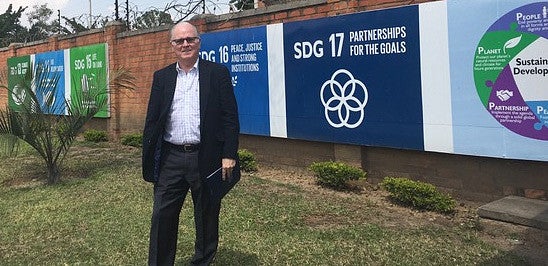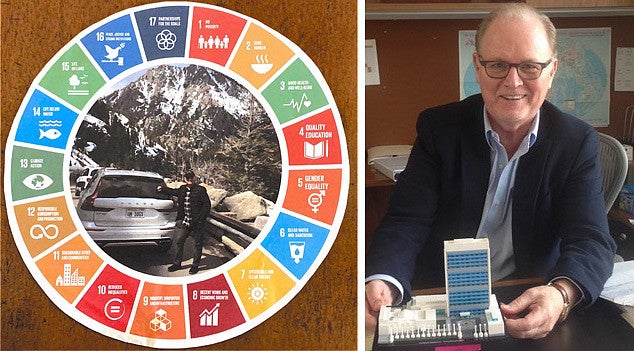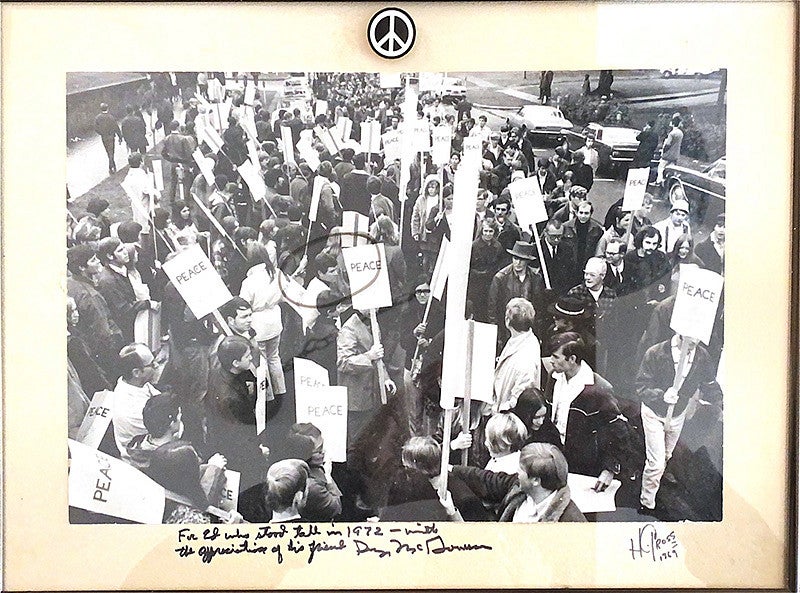
Adrian Parr Zaretsky, Dean of the College of Design, will present the 2022 Ellis F. Lawrence Medal to Edmund J. Cain, Jr., MA ’70, during the June 13 commencement ceremony, which marks the return of in-person graduation activities at the University of Oregon (UO). This honor is awarded each year by the dean to a distinguished alumnus or alumna through a faculty nomination process. The recipient of the Lawrence Medal serves as the College of Design commencement speaker each year.
This year's medal is being awarded to Cain in recognition of his lifetime work promoting sustainable development around the globe, through career appointments at the United Nations (UN) where he served in New York, Malaysia, the Philippines, Myanmar, Afghanistan, and as a UN Resident Coordinator in Turkey and Egypt; the Carter Center in Atlanta, Georgia; and the Hilton Foundation in Los Angeles.

Cain shows his pride in his work at the UN through his personalized license plate and the model he is holding of the UN headquarters building, made by his grandson using legos.
"It is both astonishing and heartening to read about Ed Cain's experiences at the UO as a graduate student in Public Administration. His intellectual journey, as he gravitated toward courses that emphasized practical and holistic solutions to poverty, illustrates an enduring ethos of the UO and of the School of Planning, Public Policy and Management and its predecessor, the Lila Wallace School of Community Service and Public Affairs. His humanitarian outlook and search for nuanced and workable solutions to poverty and humanitarian crises resonates in our students today," explained Renee Irvin, Associate Professor and Associate Director of the School of Planning, Public Policy and Management (PPPM). "Ed's career, from Assistant to the City Manager of Grants Pass to the United Nations, the Carter Center, and the Conrad Hilton Foundation illustrates for our graduates the possibilities open to our students. We are thrilled to have him come back to campus and inspire our students to follow similar paths in their lifetimes."
Cain attributes his worldview and fifty-year career in international human development in part to his UO educational experience.
“My initial career intention was to become a lawyer since I had no idea how I might find a job with a degree in Political Science from the University of Delaware,” said Cain.
"[The year I earned my BA] was one of the most turbulent and traumatic years of the 20th century in the United States,” said Cain. “College seniors had few positive memories of 1968. Added to student unrest against the war in Vietnam was the assassination of Martin Luther King in April and Robert Kennedy two months later. Flags were flying at half-mast over my college graduation ceremonies. Oregon in some way seemed like a refuge. My interest in attending the University of Oregon Law School was driven by the allure of Oregon being a land of great environmental beauty.”

Ed Cain, circled in black, at an antiwar protest in 1969 at the University of Oregon.
After one semester with the law school, Cain found himself more attracted to the various student organizations on campus that were protesting the war in Vietnam, addressing poverty, and dealing with environmental issues.
“I was eager to be more engaged in the social issues of the time and had little comradery among my fellow law classmates,” explained Cain.
He met Richard Collins, PhD, faculty in the Lila Wallace School of Community Service and Public Affairs (PPPM's predecessor), who took Cain under his wing and helped him devise an interdisciplinary MA within the school’s Division of Public Affairs and International Development. Through Collins, Cain learned about and successfully applied for an internship at the UN, and received a congratulatory letter from UO President Robert D. Clark when Cain was chosen for this high honor.
After earning his master's degree in public affairs, Cain spent two years as the assistant to the City Manager in Grants Pass, Oregon, before moving to New York City to become a career officer in the United Nations Development Programme (UNDP), devoting his life to fighting poverty across the globe.
Over his thirty-year career at the United Nations (1972 – 2001), Cain held a variety of international positions where he witnessed and was involved in alleviating the effects of many of the late-twentieth century’s most devastating wars and humanitarian crises. During that time, he believes the most significant work of the UN was the evolution of a new global agenda, defined and ratified by the creation of the United Nations Sustainable Development Goals (UNSDG), unanimously adopted by the UN General Assembly.
The Sustainable Development Goals serve as a seventeen-point framework for peace and prosperity for nations and people across the globe. This framework aims to measure the prosperity of people and nations beyond simple economic measures of gross domestic product (GDP) and provides substantive support and capacity-building for a broad range of sustainable development goals for nations around the world including, but not limited to, gender equality, health and well-being, affordable clean energy, sustainable cities and communities, and clean water and sanitation. The pride Cain has in this work is evident to anyone who sees him driving down the road, sporting his personalized license plate that reads: UN SDGS.
Building on his work at the UN, Cain was recruited to direct the Carter Center’s Global Development Initiative from 2001 to 2006. Founded by former United States President Jimmy Carter and former First Lady Rosalynn Carter, the mission of the Carter Center is to prevent and resolve conflicts, enhance freedom and democracy, and improve health worldwide. As part of that mission, Cain directed the global development initiative to enhance development assistance in some of the poorest countries. The initiative, which ran from 1993 to 2006, was advanced through on-the-ground work in four partner countries—Albania, Guyana, Mali, and Mozambique. The centerpiece of the initiative was the recognition that effective change cannot be promoted from outside a country. This approach outlined a broad vision for the transformation of a society and the essential policies, investments, and actions that needed to be taken by the partner nation’s business community, government, non-governmental organizations, and individual citizens in the drafting of their own unique national development strategy. As the leader of the initiative, Cain tracked progress in achieving the development goals, country by country. He helped each nation shape its comprehensive strategies, monitored their progress, and informed the international community of the successful and unsuccessful strategies through a series of international development cooperation forums.
After the last development cooperation forum was held in December 2005, Cain accepted a position as the Vice President of Grant Programs at the Conrad Hilton Foundation, a position he held from 2006 until his retirement in 2018. The mission of the Hilton Foundation to improve the lives of individuals living in poverty and experiencing disadvantage around the world aligned perfectly with Cain’s work.
At the Hilton Foundation, he directed all aspects of grant programs as well as the organization’s strategic planning efforts, leading to a new “Philanthropic Approach” focused on supporting philanthropic activities that have long-term outcomes and value collaboration as a means to achieve them.
Among the many activities funded by the Hilton Foundation, one of the most meaningful to Cain is the foundation’s support of Measure of America and its American Human Development Project, which introduced the American Human Development Index. This measures the well-being of all Americans based on indicators in three key areas: health, education, and living standards. Instead of measuring America based on the question, “how is the economy?,” it asks, “how are people doing?”. This work is informed by and supportive of the UN’s Sustainable Development Goals, and allows for well-being rankings of all 50 states, 436 congressional districts, county groups within states, women and men, and racial and ethnic groups.
“From his time as a University of Oregon student to his fifty-year career in international human development, Ed Cain is a perfect example of what it means to be a Lawrence Medalist, a distinguished UO alumnus, and just an all-around good person,” says Dean Adrian Parr Zaretsky. “We are excited to have him be our first in-person medalist to speak on campus after two years of virtual ceremonies. I am honored to present the Lawrence Medal to him in recognition of his tireless work to advance sustainable human development, work toward peace, fight disease, and build hope in all corners of our world, and his leadership in bringing government, business, and philanthropy together to improve lives worldwide.”
